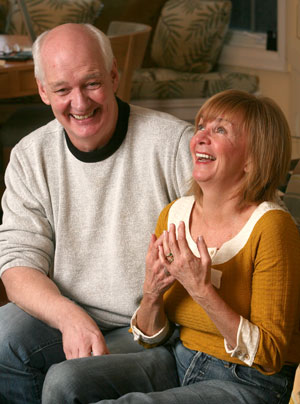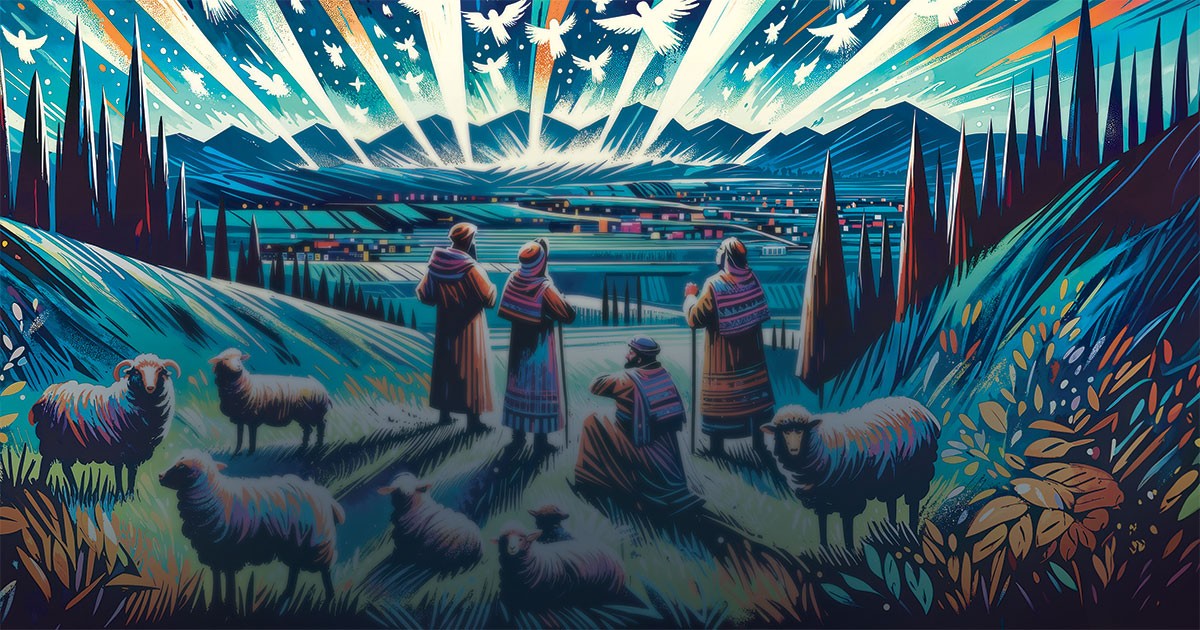 Colin Mochrie and Debra McGrath
Colin Mochrie and Debra McGrath
Colin Mochrie and Debra McGrath are part of the “royal jelly” of Canadian comedy. Debra is perhaps best known for Little Mosque on the Prairie, which wrapped up its final season last year. Colin established his reputation as an improv genius on Whose Line Is It Anyway?
Pastor Ken Gallinger chatted with Colin and Debra at their home in Toronto.
I know two things about you. I know you met when Deb was auditioning Colin for Second City. And I know you, Colin, once said, “The best way to get a laugh is to take your pants off.” Is there a connection?
Debra McGrath: No! He kept his pants on the whole time.
Colin Mochrie: I did. I did. I was very good. I wasn't that desperate for the job.
DM: We weren't interested in each other at first. I loved his charm, but he kind of stood back—didn't put himself forward. But I hired him, and love grew. We've been married 23 years.
Christians generally, in my experience, tend to be like Reverend Thorne on Little Mosque on the Prairie—a humourless lot. What is it about humour that threatens us?
DM: The church of my childhood wasn't a place where you could break up with laughter. Lessons, guilt, fear; everything by rote. People fear that if you add humour to a situation, you're making light of it. “Religion is serious.”
CM: But isn't celebration supposed to be part of it? Celebration of the Scriptures. Celebration of life. Humour seems like a form of appreciation for what we've been given.
Colin, one of your funniest sketches from Whose Line Is It Anyway? is the “Noah's Wife” bit. It takes me back to when I learned the Noah story from Bill Cosby.
CM: “How long can you tread water?” And Charles Schulz is another example. There was a lot of religion taught by Peanuts. If someone's just talking at me, well, my mind starts to wander. But if someone uses humour, it engages you.
DM: And it doesn't have to be hilarious. Just a bit of lightness helps. And humanness. You look at the most tragic times in human history, and you've got to recover your sense of humour; it's the only way you can get through things.
So how do we get more lightness, more joy into church life?
DM: Young people who come to church fear the “shoulds,” the sense of heavy obligation. Colin recently did a big fundraiser for our congregation. It was lovely to see a church full of young people howling with laughter.
CM: I love the people at our church. Our son's a big part of it, too—the church has helped make him into a lovely human being.
DM: We had lots of conversations about what he was doing there. And I said, “Luke, if you end up the most religious man in the world, then that's where your heart takes you. If you end up agnostic, an atheist, that's fine, too.” I wanted him to have a place that was faith-based, that reminded him we are not alone.
You've spoken about the value of church for Luke. What else is in it for you?
DM: For me, it's the eternal human struggle for the meaning of life. Life has got to be more than flesh and bone. I witness the beauty of the human spirit, which is so strong sometimes I'm in awe of it. The church is a place that not only helps me navigate through that. It helps me see it, alive, in the flesh. I have found unselfish kindness there. And I've come to know Jesus. As a child, Jesus terrified me. My favourite part about going to church has been getting to know Jesus as a human with a big heart. I like the way He does things.
Colin, I've heard you say your view of faith is “healthy cynicism.”
CM: Ha! That sounds like me. Deb is a sunny personality, an optimist. I'm pretty much the opposite. Going to church helps reaffirm that, oh yeah, we're not all horrible. I find it sad that we're so often surprised by human kindness. In our business, you come across a lot of people who aren't as nice. And it's a constant struggle for me—because I go easily to the dark place as well.
The dark place?
DM: Many comedians have a lot of bitterness, a lot of regret, a lot of fear. And out of that come huge amounts of funny.
CM: People use whatever tools they have to get through, whether it's faith, whether it's comedy. I've found that, at my lowest points, these were the times when Deb and I were killing ourselves laughing. We've been poor, desperate, selling our CDs to buy groceries. We've had nothing. But we always had our humour. Yes, it was a dark humour—
DM:—and sometimes we'd go straight from crying to laughing—
CM:—but as long as you can laugh, you can keep going on.
DM: Right now we're going through a very challenging time with elderly parents. There are days I think I'm going to lose my mind. But then we'll look at each other and start to laugh, and it gets you through.
CM: If you can see the humour in the darkest of situations, some of that darkness goes away.
My mom was a very funny woman who died a bad death far too young. Right before she died, a young nurse came into the room and asked her, “Barb, how can you laugh in a situation like this?” And Mom said, “Have you got a better idea?”
CM: It brings you to acceptance. It brings you to life. Laughter is an underrated tool.
DM: When my dad was desperately sick, a nurse asked him, “Are you hot?” And he said, “Geez, I used to be.” In those moments, the tears are streaming down your cheeks, tears of both loss and laughter. He comes up with this crack, and he's fully alive again. Fully alive.









Leave a Comment